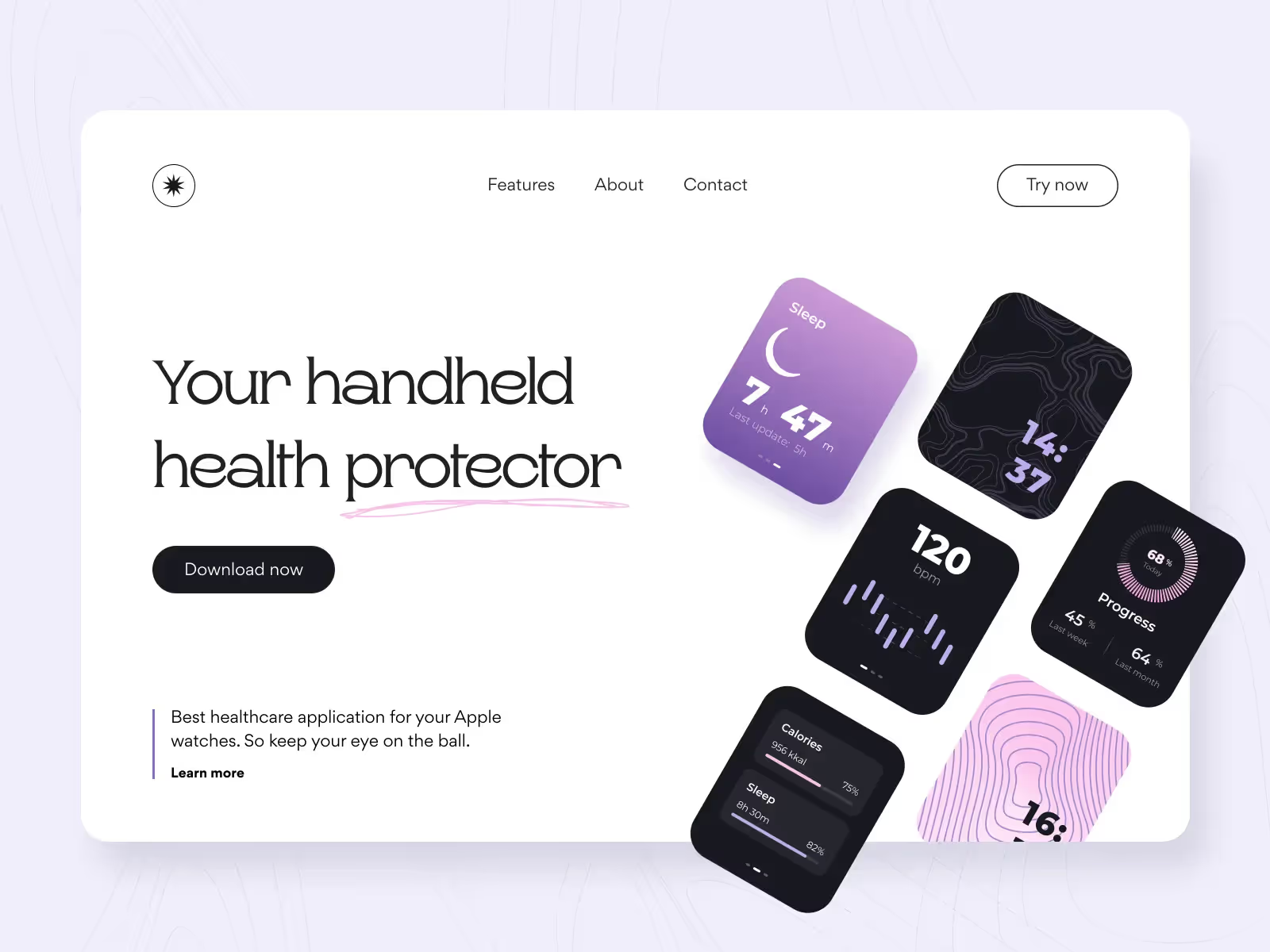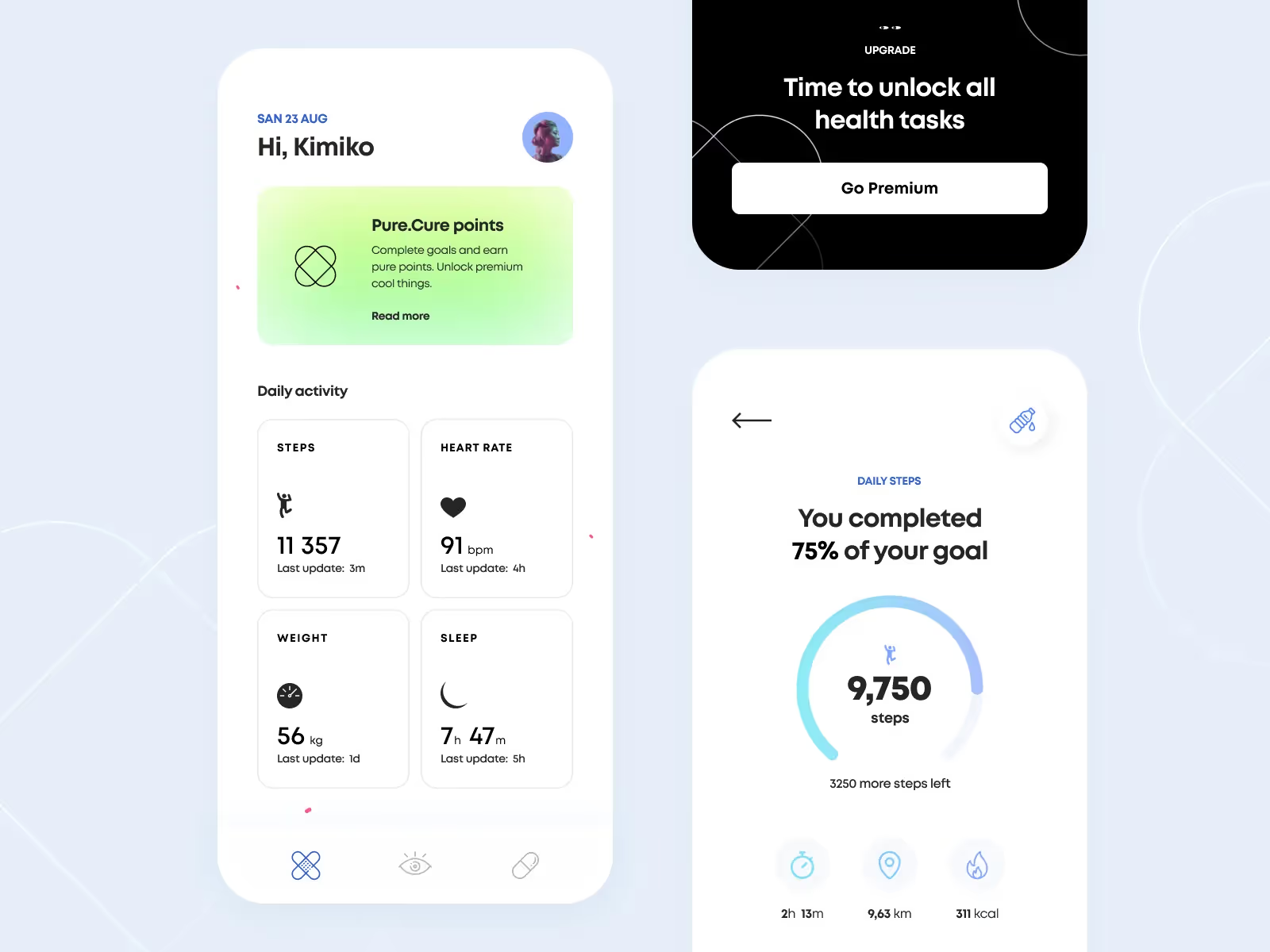If you are ready to enhance your web design with expert solutions, let’s talk!
Research indicates that emerging trends will propel the global healthcare sector to reach an immense value of $665.37 billion by 2028. This growth aligns with the increasing demand for solutions in the booming healthcare app industry.
Understanding each development stage and approximate timeframes is crucial when creating your solution. It enables you to effectively plan and maintain consistency throughout the whole process.
Since 2016, the Arounda team has assisted many clients in creating human-centric healthcare designs. Based on our experience, we can estimate the duration of creating a new solution or enhancing an existing one. This article will share how much time you need to make a mobile health app.
Overview of Healthcare App Types

Healthcare apps empower individuals to manage their well-being effectively. Customers use them for various purposes, including tracking fitness goals, monitoring health data, and receiving timely reminders for medical appointments and treatments.
Before we answer the question, “How long does it take to build a healthcare app?” let’s examine the key types of such apps.
Medical reference and information apps
Medical reference and information apps grant immediate access to diverse resources. These tools provide drug information, medical dictionaries, and symptom checkers. They equip healthcare professionals and patients with accurate knowledge at their fingertips.
Telemedicine apps
They enable patients to consult healthcare providers through video conferencing or other digital means. It is especially beneficial for those in remote areas or with travel difficulties.
Fitness and wellness apps
These applications offer features for tracking physical activity, dietary patterns, and stress management. Such tools promote well-being and assist in managing chronic conditions.
Medication management apps
This kind of app assists users in managing and tracking their medications. They include dosage information, schedules, and potential interactions. It enhances medication adherence and reduces the risk of adverse drug events. Also, they promote safer and more effective medication management.
Disease management apps
They support individuals in managing chronic conditions like diabetes, hypertension, or asthma. They track symptoms, provide reminders, and offer educational resources.
Women's healthcare apps
These applications provide valuable support for women's health concerns. They include fertility and menstrual cycle tracking and pregnancy monitoring.
Mental health apps
These applications support mental health conditions such as anxiety, depression, and addiction. They provide interventions like meditation practices, cognitive-behavioral therapy techniques, and other therapeutic approaches. For example, you can check out the Bold App we created to help people relax.
Personal health record apps
These apps allow for managing personal health information efficiently. It might include medical history, allergies, and test results. These apps ensure continuity of care and reduce the risk of medical errors.
Key Benefits of Healthcare Apps

Mobile healthcare is the future, offering many advantages for patients and doctors.
Whether seeking medical help or providing care, incorporating mobile health apps into daily life can revolutionize healthcare delivery and experience. Let’s examine in detail why it is worth the time and effort to make a mobile health app.
Improved Health Data Gathering with Mobile Health Apps
Mobile health apps offer convenient access to patient health data, enabling faster retrieval for healthcare providers. Doctors analyze comprehensive clinical data to make well-informed medical decisions. These apps also allow patients to access, organize, and store their medical records. Additionally, certain apps aid in the early detection of chronic conditions, heart disease, and mental health issues.
Reducing Preventable Medical Errors
They give healthcare professionals fast access to clinical resources and help make diagnoses. Doctors and nurses can retrieve medical and drug databases and lab results. Also, they can use tools like drug reference guides and calculators. These resources improve decision-making, reduce errors, and enhance efficiency. Apps offer early warnings about complications for patients, enabling timely treatment planning.
Reducing Costs for Patients and Hospitals
Telemedicine and telehealth services offer cost-effective benefits for healthcare providers and users. Apps reduce costs by minimizing unnecessary procedures, preventing chronic illnesses, and lowering hospital readmission rates. This cost-saving aspect benefits patients and hospitals, making healthcare more affordable and efficient.
Enhancing Patient-Doctor Communications
Apps facilitate convenient and secure patient-doctor communication, allowing patients to schedule appointments, communicate with caregivers, and order prescriptions. It enhances engagement and outcomes while enabling doctors to monitor postoperative patients remotely, benefiting patients and healthcare providers.
Promoting a Healthy Lifestyle
Popular healthy life apps assist individuals in maintaining fitness, following diets, and improving sleep patterns. Integrated with smartwatches and fitness trackers, they enable tracking personal data like sleep patterns, body mass, heart rate, blood pressure, and calorie consumption. This data helps users set realistic fitness goals and achieve a healthier lifestyle.
Estimating the Creation Time for a Healthcare App

Determining the time required to make a mobile health app can be challenging. It involves factors like development processes, technical expertise, and platform selection.
Inception
The project starts with defining the scope, creating a roadmap, planning resources, and setting budgets. This phase typically takes around four to six weeks.
As part of the inception phase, technical documentation plays a vital role. It involves business analysis, specification creation, and prototype design. The time needed for technical documentation varies based on the app's complexity and features. Typically, it ranges from 40 to 80 hours.
While it may seem like a significant investment, it is crucial for a successful app development process.
Design
On average, a design stage takes 80–240 hours. It involves designing a well-crafted health and fitness app, including UX and UI components. However, the actual time can vary based on specific app requirements. For more complex apps with additional features, the design phase may extend to 320–720 hours.
Development
The development stage is the most time-consuming phase. It involves front-end, back-end, and platform-specific development for your chosen platforms. Given the importance of cross-platform availability, it's essential to consider time for iOS and Android platforms.
Front-end development typically takes around 190 to 200 hours, while back-end development can range from 350 to 400 hours. Making a mobile healthcare app for iOS may require 450 to 480 hours. And if you want to make a mobile healthcare app for Android, it can take approximately 380 to 400 hours. In total, the development time ranges from 1.370 to 1.480 hours.
Testing & Quality Assurance
The testing stage ensures the quality and functionality of your app. The time needed for testing depends on the app's features and functions, ranging from 80 to 300 hours. Thorough testing is essential to identify and address issues or bugs, ensuring a high-quality end product.
Post-development
It would be best to allocate time to fix bugs and resolve errors during this phase. Also, it's critical to add finishing touches and maintain and update features continuously. Initially, bug fixes and polishing typically require around 30–50 hours.
Consider that ongoing maintenance and feature updates will require additional time and effort.
Please note that these estimates may vary based on the complexity of the app and the number of issues.
Summary
So, how long does it take to build a healthcare app? It all depends on factors like the complexity of the app and the number of features you want. You can navigate the timeline by having detailed technical specifications and accurate forecasts.
Over the past seven years, Arounda has supported healthcare startups and SMEs in their journey toward success. We create human-centric and intuitive healthcare designs that set your product up for success.
Contact us for an estimate and expert guidance to launch your healthcare app successfully.





